

Team
TrustWorks is comprised of leading peace and conflict specialists with extensive expertise in working with companies, investors and governments.
We form inter-disciplinary teams to meet the needs of each assignment; we recognise that needs evolve over time and we adapt accordingly. We never compromise on quality and remain committed from start to finish.
-
All
-
Staff
-
Senior Advisors and Associates
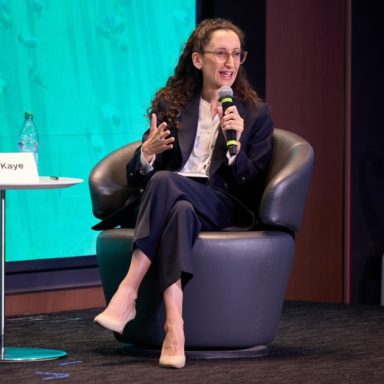
Josie Lianna Kaye
Chief Executive Officer & Founder
Josie is the Chief Executive Officer and Founder of Swiss-based social enterprise, TrustWorks Global. Josie’s expertise lies in supporting businesses and investors to operate responsibly in conflict-affected areas in line with normative and regulatory expectations concerning heightened human rights due diligence and conflict-sensitivity. Josie has over 18 years of experience working with public and private sector actors in fragile and conflict-affected settings and she holds a PhD from the University of Oxford on the role of licit and illicit business actors in the dynamics of conflict and peace.
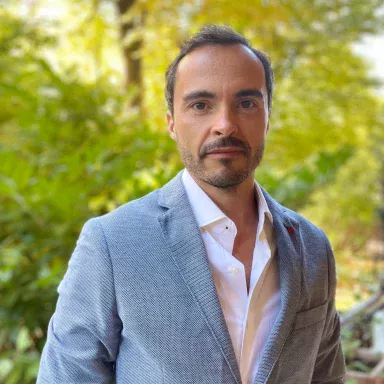
Aurélien Laurence
Chief Financial Officer
Aurélien is the Chief Financial Officer (CFO) at TrustWorks. He is in charge of the company’s administrative management, finances, accounting, bookkeeping, operations and logistics. Working closely with the CEO, he provides day-to-day support to the team and ensures that tasks are planned under the supervision of the CEO to advance the future of the social enterprise through TWG’s policies, internal processes and external services.
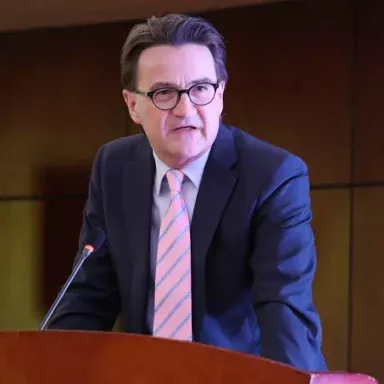
Claude Voillat
Programme Director & Senior Advisor
Claude brings 20 years of experience leading the work of the International Committee of the Red Cross (ICRC) on the nexus ‘business and human rights’. His main focus is business operations in fragile and conflict-affected areas. Within this field, he has engaged extensively, and participated in the development of concepts and processes such as ‘do no harm’, ‘conflict-sensitive practices’, and ‘heightened human rights due diligence’ applied to business operations.

Simon Ehmsen
Research & Programme Officer
Simon is a Research and Programme Officer at TrustWorks and supports the CEO and Senior Advisors on client initiatives, business development and day-to-day operations. He conducts desk-based conflict analyses and background papers related to all three pillars of our work.

Marc Jacquand
Senior advisor
Marc has over 20 years of experience in the field of crisis and post-conflict strategic planning. He has worked with United Nations peace operations as well as in the Executive Office of the Secretary-General to coordinate the UN’s integrated support across political, development, humanitarian and human rights. He is currently deployed with the United Nations Department of Safety and Security as director of strategy.

Sarah Cechvala
Senior advisor
Sarah is a Senior Advisor at Trustworks Global. Her expertise lies in supporting businesses and international aid organizations to operate in a conflict-sensitive way, enhance stakeholder engagement and accountability, apply a systems lens, and, when possible, promote peace. She has 15 years of experience working with public and private sector actors in over 30 fragile and conflict-affected areas.
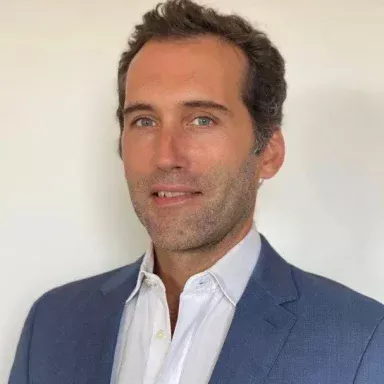
Arthur Boutellis
Senior advisor
Arthur brings 20 years of experience in fragile and conflict-affected areas specializing in mediation and negotiations with armed groups, political and security risk analysis, Security Sector Reform (SSR), and Disarmament, Demobilization and Reintegration (DDR) as well as prevention and counterterrorism. He is both an academic researcher and an active practitioner, spending part of the year in the field, primarily in Africa, and part of the year in Paris and New York teaching students and training professionals.

Ben Miller
Senior advisor
Ben has more than 15 years of experience working with companies in a range of industries in fragile and conflict-affected areas. He has contributed substantially to public knowledge of good practices in that area, having developed tools and guidance for practitioners in specific industries and published on a range of topics relating to business, conflict, and peace. His work is focused in particular on the application of conflict sensitivity, conflict risk mitigation, and heightened human rights due diligence in the context of specific business operations.
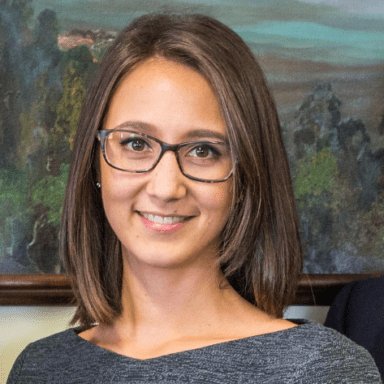
Fauve Kurnadi
Senior advisor
Fauve brings over 15 years of experience in public international law, principally in the area of international humanitarian law (IHL). Fauve’s work aims to enhance IHL awareness among Australian corporate actors and to encourage the integration of IHL rules and principles into the actions and decisions of businesses with operations in conflict-affected areas. She has also contributed substantially to improving the inclusion of IHL in global dialogues and expectations concerning corporate compliance with IHL.

Oli Brown
Senior advisor
Oli has been working at the nexus of security, natural resources and climate change for the past 20 years, with interests in strategic planning, peacebuilding, conflict mediation, natural resource management, and environmental politics.
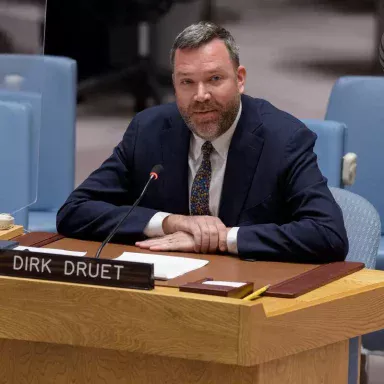
Dirk Druet
Senior advisor
Dirk is a researcher, policy adviser and strategist on multilateral peace and security interventions. He is a former official of the United Nations Departments of Peace Operations and Political and Peacebuilding Affairs, where he led policy initiatives at Headquarters on asymmetric warfare, intelligence, technology and conflict prevention in authoritarian regimes.
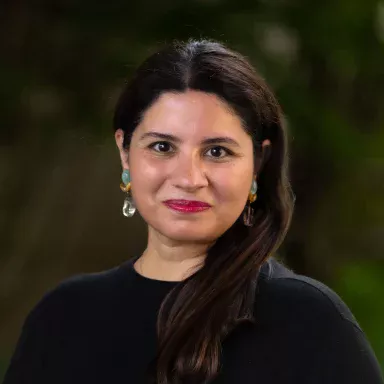
Nur Laiq
Senior advisor
Nur is a fellow at the Harvard Kennedy School of Government. Nur has over fifteen years of experience as a policy practitioner working on conflict resolution, mediation, peacebuilding, and governance. Her research offers a deeper understanding of the role of politics and policymaking in digital governance and around digital public goods in the context of both peacebuilding and economic development. Her work aims to better inform decision making around the future of technology policy at the national and supranational levels, especially at the United Nations.

Alexander Costy
Senior advisor
Alexander served with the United Nations for over 20 years covering a wide range of senior management and advisory functions in aid and political affairs in conflict settings. His UN mission assignments have included Baghdad, Kabul, Jerusalem, Kathmandu and most recently Beirut, where he served as Principal Political Advisor and Chief of Staff for the Office of the UN Special Coordinator for Lebanon. In Africa he served as a mission planning co-lead for the UN Assistance Mission to Sudan (UNITAMS), and has worked also in Angola and Mozambique
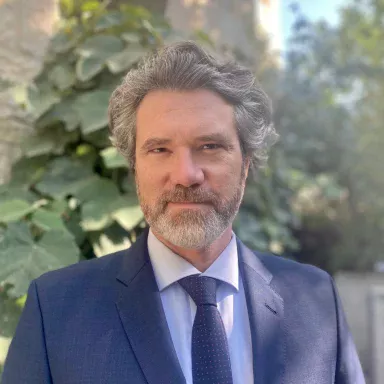
Guillaume Lacaille
Senior associate
With more than 20 years of experience in international security, serving in EU and UN field missions and working in global think tanks, Guillaume leads strategic assessments, evaluations and analyses in fragile and conflict-affected areas. He has advised various donors and national authorities on peacebuilding and the effectiveness of security institutions facing new threats and rapid geopolitical changes. Currently based in Jerusalem, he has lived in a dozen countries.

Natalia Voronova
Senior associate
Natalia brings over 15 years of experience and a multidimensional profile covering human rights, institutional building, monitoring, evaluation, strategic results-based management. Throughout her career, she has collaborated with organizations such as the OSCE, UNDP, UNCDF, GIZ and has contributed to over 70 development projects and programs in 16 countries across Europe, Africa, and the Arab States.
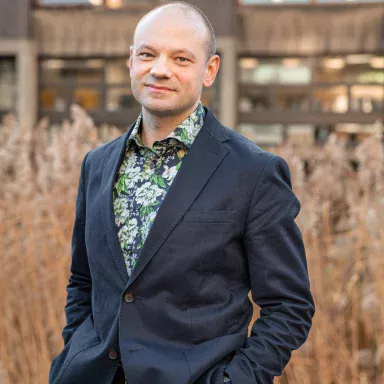
David Griffiths
Senior associate
David has around 20 years’ broad experience in human rights, and now consults with philanthropy, INGOs, and governments on strategy across human rights, climate, inequalities, and peace and security. His recent clients include the EU, Open Society Foundations, International Crisis Group, and Human Rights Watch. He is an Associate Fellow of Chatham House, where he has published two reports on the future of human rights, and a member of the OSCE Panel of Experts on Freedom of Religion or Belief.

Rainer Gude
Senior associate
Rainer has been in the field of peace for 15 years and currently focuses on peace processes, political transitions and national dialogues. His work consists in helping the local civil society organizations and networks facilitate, accompany, and nurture homegrown solutions in fragile and conflict-affected areas.
He is also a Peace Process Support Advisor for Inclusive Peace with experience in Ethiopia, South Sudan, and Niger as well as volunteers with various local and international peace and youth networks.
